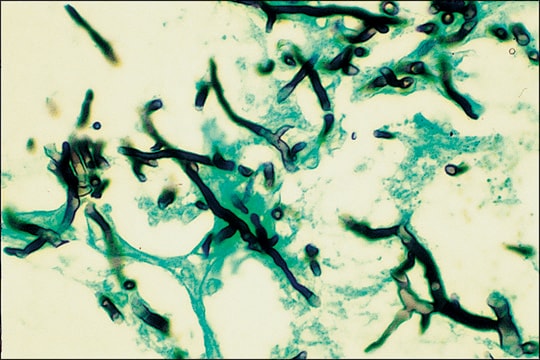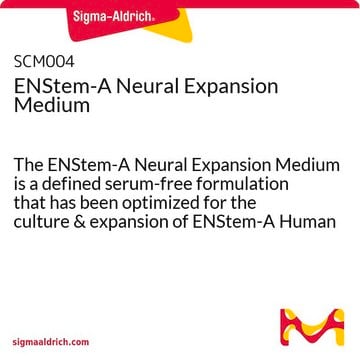SE100
Silver Enhancer Kit
Se connecterpour consulter vos tarifs contractuels et ceux de votre entreprise/organisme
About This Item
Code UNSPSC :
12171500
Nomenclature NACRES :
NA.47
Produits recommandés
Forme
liquid
Niveau de qualité
Utilisation
sufficient for ≥100 slides staining and fixing
Application(s)
diagnostic assay manufacturing
hematology
histology
Température de stockage
2-8°C
Application
Silver Enhancer Kit has been used to determine the presence of gold nanorods in various tissues and to prepare silver enhanced gold colloids for electron microscopy.
Caractéristiques et avantages
Colloidal gold labels are normally visible only at the electron microscope level. Silver Enhancer enlarges the gold colloid label by precipitation of metallic silver to give a high contrast signal visible under a light microscope. A darkroom is not necessary for this procedure, as the silver enhancer working solution is light-stable for 20-30 minutes under ordinary laboratory lighting.
Conditionnement
The Silver Enhancer kit consists of Solution A (silver salt), Solution B (initiator), Sodium Thiosulfate (fixer), and a Technical Bulletin describing their use.
Principe
Solution A and Solution B are mixed 1:1 immediately before use and applied to the slide holding the gold-labeled section. After 5-10 minutes, the slide is rinsed with distilled water, fixed for 2-3 minutes in a sodium thiosulfate solution, and rinsed again. The section is now ready for counterstaining and mounting as required.
Composants de kit seuls
Réf. du produit
Description
- Sodium thiosulfate pentahydrate, reagent grade, ≥99.5% 500 g
Mention d'avertissement
Danger
Mentions de danger
Conseils de prudence
Classification des risques
Aquatic Acute 1 - Aquatic Chronic 1 - Repr. 1B
Code de la classe de stockage
6.1C - Combustible acute toxic Cat.3 / toxic compounds or compounds which causing chronic effects
Point d'éclair (°F)
Not applicable
Point d'éclair (°C)
Not applicable
Faites votre choix parmi les versions les plus récentes :
Déjà en possession de ce produit ?
Retrouvez la documentation relative aux produits que vous avez récemment achetés dans la Bibliothèque de documents.
Using Immuno-Scanning Electron Microscopy
for the Observation of Focal Adhesion-substratum
interactions at the Nano- and Microscale in S-Phase Cells
for the Observation of Focal Adhesion-substratum
interactions at the Nano- and Microscale in S-Phase Cells
Manus J.P. Biggs
Cell Culture Labfax (2011)
Kathleen Grennan et al.
Talanta, 68(5), 1591-1600 (2008-10-31)
With lower limits of detection and increased stability constantly being demanded of biosensor devices, characterisation of the constituent layers that make up the sensor has become unavoidable, since this is inextricably linked with its performance. This work describe the optimisation
A histological evaluation and in vivo assessment of intratumoral near infrared photothermal nanotherapy-induced tumor regression
Hadiyah N
International journal of nanomedicine (2014)
Tsung-Ting Tsai et al.
Scientific reports, 7(1), 3155-3155 (2017-06-11)
In this study, we investigated the antibacterial activity of silver-coated gold nanoparticles (Au-Ag NPs) immobilized on cellulose paper. Ag NPs are known to have strong antibacterial properties, while Au NPs are biocompatible and relatively simple to prepare. We made the
Yuan Chen et al.
Oncotarget, 9(41), 26556-26571 (2018-06-15)
Tumor hypoxia is a well-recognized driver of resistance to traditional cancer therapies such as chemotherapy and radiation therapy. We describe development of a new nanoconstruct composed of gold nanorods (GNRs) conjugated to carbonic anhydrase IX (CAIX) antibody that specifically binds
Notre équipe de scientifiques dispose d'une expérience dans tous les secteurs de la recherche, notamment en sciences de la vie, science des matériaux, synthèse chimique, chromatographie, analyse et dans de nombreux autres domaines..
Contacter notre Service technique










